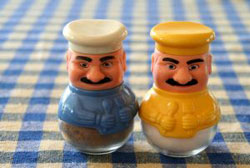Food, Pleasure and Science
by Kim | December 30, 2008

Michael Pollan created a famous seven-word rule of thumb for a good diet: "Eat food. Not too much. Mostly plants." In an interview with Tara Parker-Pope about his book, In Defense of Food, he mentions three of the biggest players on the playing field when it comes to diet: food, pleasure, and science.
To understand howdeeply science has invaded the realm of taste one only has to read "Why McDonald's Fries Taste So Good" from Eric Schlosser's Fast Food Nation. He describes the discreet flavor chemists in white coats who engineer tastes stored in bottles, quite separate from food. The billion-dollar American flavor industry has found a way to manipulate the sense of taste (which evolved as a way to avoid being poisoned) so that it is used not to protect the integrity of the organism but to benefit corporations. Science has not stopped with manipulating the tongue with versions of the five basic flavors. It can now manipulate the taste buds so that they react more strongly to sugar or salt, thanks to human genome sequencing. The Senomyx corporation has identified hundreds of those taste receptors that its chemical compounds target. The intent is to reduce the amount of salt in a food without compromising taste, but that industry would have found a way to pluck the right notes from our tongue as if it were a guitar seems like something from Brave New World or some other science fiction scenario.
Given that foods are so integral to our memories and emotions, this infiltration of flavorings into flavor means that science has been used to commodify things like a happy holiday or a relaxing moment, conflating the item consumed with the occasion. The reason why commercials featuring voluptuous cheeseburgers and gooey chocolates don't seem over the top is that science also has a thumb on the pulse of our imaginations, and thus our cravings. According to the book, The Psychology of Food Choice, cravings may actually be helpful bodily responses that lead us to seek out foods that we've had a positive experience with in the past. Studies have found that the ""imagery processes involved in food cravings are predominantly visual in nature," however, leaving them open to the influence of marketing. Conversely, another study found that imagery techniques maybe key to combating food cravings among people with eating disorders.
The problem is not science—it is, to return to the quotation from Michael Pollan, that science has been seen as the primary, if not only, custodian of modern nutrition. And all that manipulation of the pleasure response, the precisely-engineered aroma of the hamburger roll and the fries, the package of identically-frosted cookies, leaves us overweight, undernourished, and hungry for more. If science acts as a cop, permitting some pleasures of the palate while forbidding others, it is still not an effective agent for health. Rather, Pollan would argue, abandoning the ersatz for the pleasures of real food in moderation is healthier in the long run. In fact, The American Journal of Clinical Nutrition found that dieting women whose goal was to increase their consumption of fruits and vegetables and reduce fat lost more weight than those who were simply avoiding fatty foods.
Anyone who has ever been on a diet knows that the forbidden becomes infinitely more enticing once you can't have it. In contrast, I think Michael Pollan's seven-word guide is one that we can keep learning from, especially because it's simple and within reach. It may not be possible for everyone to get a PhD in nutrition, but anyone can follow his deliberately imprecise "not too much" and "mostly plants." What's more, less stressed-out diners can get back in touch with the natural responses of hunger, flavor, and satiety as they serve the body's needs rather than industry's. Wanting to get back to basics with food doesn't require you to be a hippie--it's only natural to want fewer forces staking claims on your mouth.

